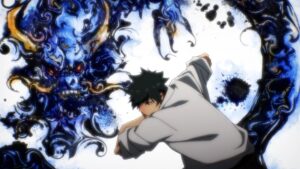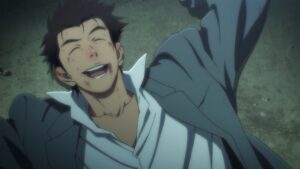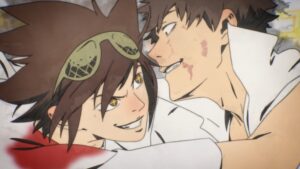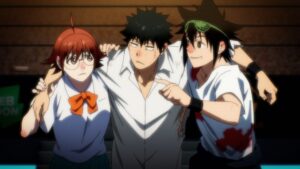Now that the Bride of High School arc has ended, we’re back to business with the GOH finals between Mori and Daewi. Their fight is flashy, fun, and brings the three main characters back together after a phase of bitter enmity – but it’s only a success if you willfully ignore episode 4’s nonsensical detours of plot and character. So that’s exactly what I’m going to do! No talk of Mira’s nanomachine-enhanced recovery, or the baffling encouragement she gave to Daewi just days after he beat her to a pulp. No dwelling on the disappointingly brief fight between Mori and Jaehee, the Brazilian Jiu-Jitsu user whose name we’d all forgotten before reading this sentence. No thinking about the fruit that Mori ate two weeks ago, which really should have taken effect by now, given how critical its framing was to that episode. It’s time to “get hype,” as the kids say, for some noncritical combat animation appreciation.
Psych! I’m still going to address the episode’s major failure, even when viewed in isolation, which is the simplicity of Daewi’s motivation. He fights to win money for his friend Seungtae’s hospital bills, which means he’s a walking cliché – but for a show like GOH, that’s fine. He also brutalizes his opponents after Park Mujin promises him an experimental cancer treatment, on the condition that he win by a huge margin (which recontextualizes his fight with Mira, though not as effectively as one might have hoped). And in the middle of his match with Mori, he sinks to his knees upon learning of his friend’s death mid-match, then powers up again when he learns that Mujin administered the treatment in advance. See the problem? Daewi’s character is defined entirely by his relationship with Seungtae. Now that he’s dead, who will Daewi become? More importantly, does it even matter?
Episode 5 gets the gang back together, friends again after Daewi’s denial that they ever had been. It’s a shallow scene, but whatever, I’m not here to harp on the complexity of an anime called The God of High School. What I do require, though, is some reason to care for the people on screen. I’ve got that for Mori, since the show has generated a lot of intrigue surrounding his lineage and combat potential, but Daewi is a former (arguably current) thug and not much else. No amount of flashbacks to his brawls with Seungtae at his side will make me interested in his character. What might have done the trick, actually, was a little more ambiguity regarding the source of his strength, but all the Forms of the Four Guardians he busted out against Mori stripped that away. Not that I blame the show for that decision. He had to go all out – not only to earn those cancer drugs, but because Mori would have kicked his head clean off his shoulders otherwise.
Their fight was easily the best thing about this episode, which is terrific, since it comprised about half its runtime. The use of moving backgrounds and POV shots gave the combat a dynamism that GOH has excelled at thus far, though its incorporation of so many special moves is sure to bother martial arts purists. As for me, I’m cool with power-ups and energy blasts, because the show doesn’t waste time in delivering them. Plenty of other shounen series use those elements as pause buttons, but God of High School creates and maintains rhythm like few other battle anime can. The only part of the Mori/Daewi match that disrupted that rhythm was the shift in art style, which temporarily adopted a thick brushwork look to illustrate the joy of the fight. That struck me as a backwards decision – those thick lines make the action feel heavier, but if both competitors are truly enjoying themselves, shouldn’t it feel lighter instead?
Points for trying something a little different, in any case, and points for the post-credits scene with Daewi visiting the columbarium where Seungjin’s ashes are stored. Even though it leans on their relationship for the tenth time, it shows that Daewi is ready to move on from his burden, and establishes that Mori and Mira will help him do it. Taping their photograph on the door of his friend’s niche parallels their roles in his life, and it puts a sentimental cap on a story that’s been heartless at times. Does it make up for all the silliness we’ve had to swallow thus far? No, but with the Seoul tournament having come to a close, GOH is poised to forget the past and move on to crazier pastures. Can it last eight more episodes without soiling its pants again? The only way to find out is to show up again next week! See you then.




